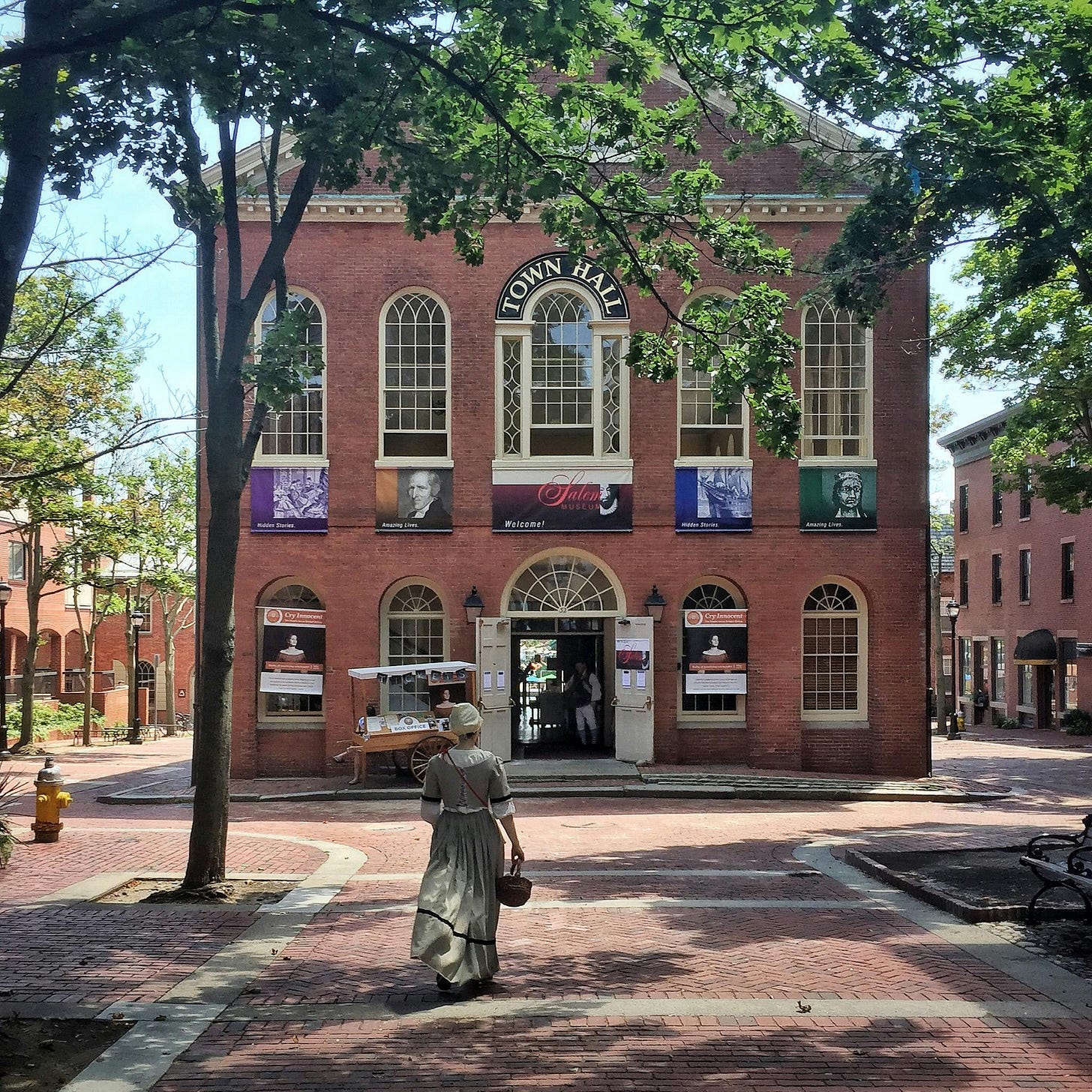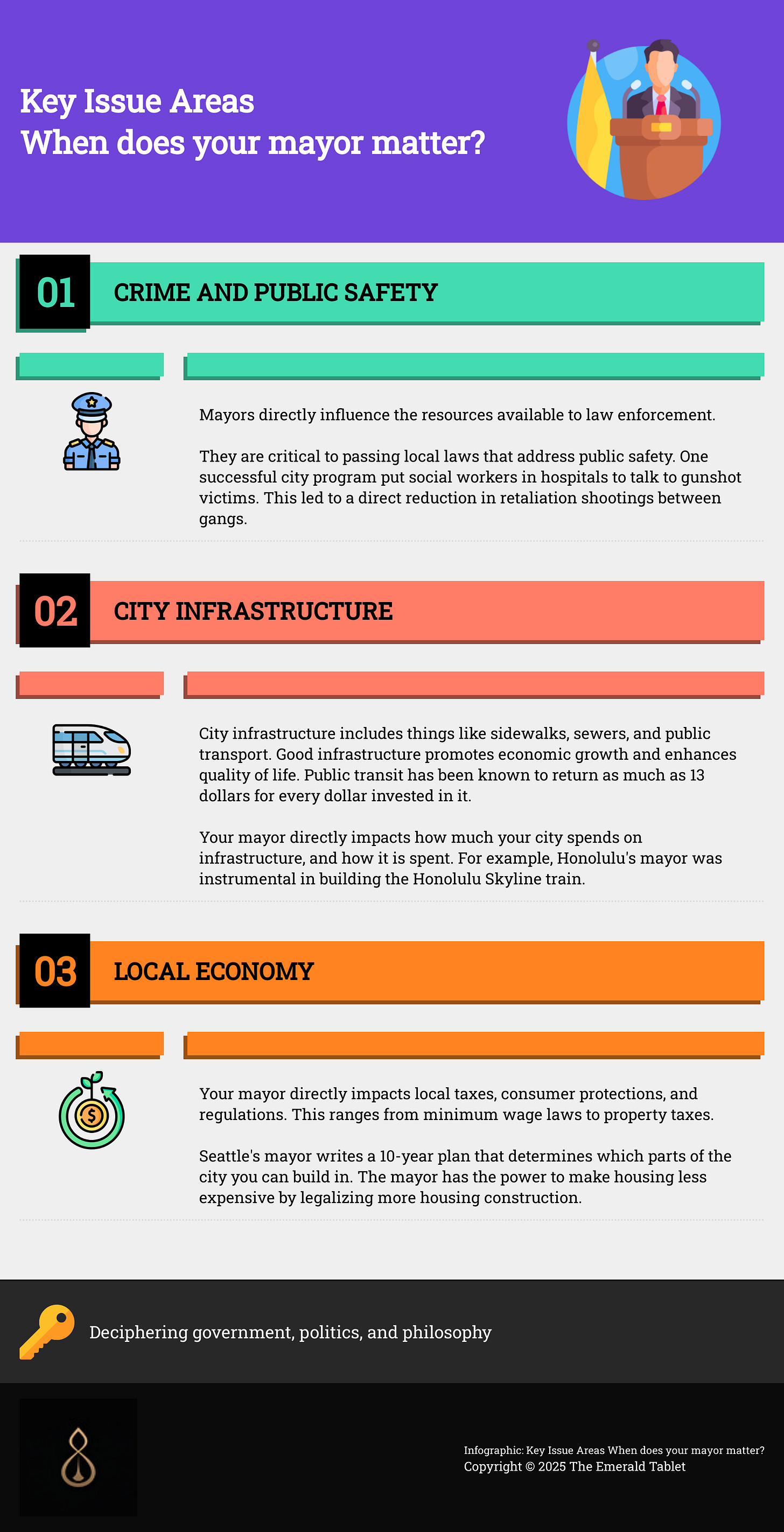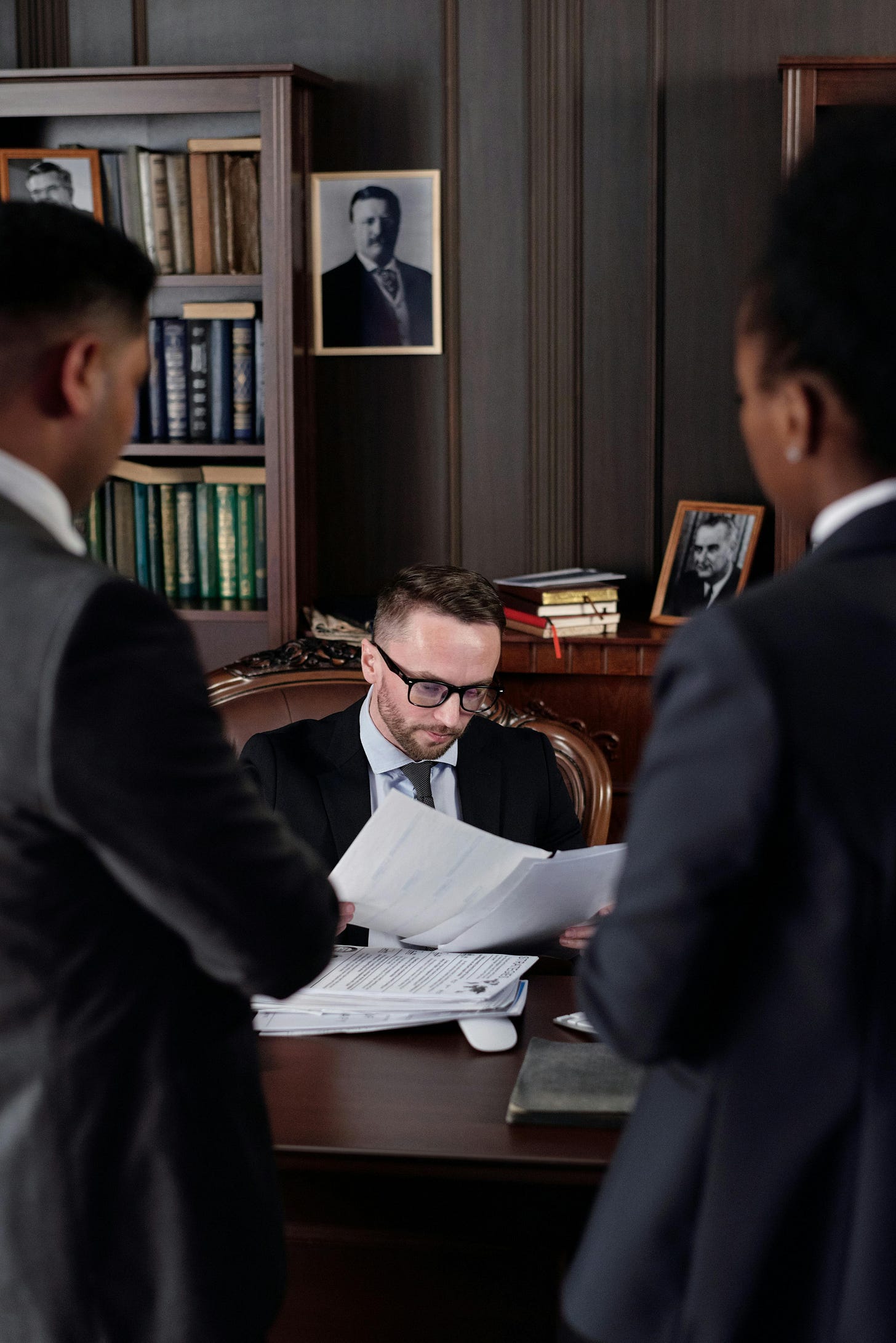What your mayor does and why it matters
A simple rundown of what mayors do, why you should care, and how you can impact their decisions.
This article is the first in a series about Local and State government. Each article will equip you with the knowledge to impact your community. Almost everything you actually care about, from crime to the economy, comes down to local officials - and most of us have no clue who they are or what they do. That needs to change.
Moving forward, I’ll be publishing every Monday and every Friday. Monday’s articles will specifically relate to good government. Friday’s articles are more fluid, and will cover anything that interests me as a writer.
Most Americans don't know and don't care about local politics. We act like passive observers, letting others dictate the course of our communities. Maybe we see the occasional headline about roads or crime, but this stuff seems like a force of nature.
The thing is - it isn't. What's more, there's a public official directly responsible for everything your town does, and you can influence what they do. Who is this official? If you've read the title, you already know: it's your mayor.
This won’t be one of my normal articles. I won't be doing deep-dives into studies, government stats, or literature reviews. This an overview of what mayors do, why you should care, and how you can directly impact your mayor's decisions. If you’re just here for the Cliff Notes, read each section's BLUF for an easy summary.
Job 1: Chief Executive Officer
Bottom-Line Up Front (BLUF): The mayor is the guy in charge, similar to a CEO of a company. They oversee the daily operations of city government. They make sure that laws are actually implemented after they get passed. That can mean appointing members of a school board, managing junior officials, or planning out a city initiative.
Case Study:
In 2013, Newark had the third highest crime rate in the nation (Link). Gun violence was everywhere, and people were angry. Fast-forward to 2022, and gun crime has plummeted by more than 50%. What changed? The city implemented a series of programs meant to address the root causes of gun violence. Social workers were put in place to prevent revenge shootings, the police established new relationships with the community, and new youth programs stopped teenagers from going down a path of crime. There were many stakeholders in this campaign, but one person was responsible for putting the right resources at the right place at the right time: Mayor Barakas. Because Newark’s mayor was an excellent manager, the town accomplished one of the greatest crime reductions in American history. It’s entirely possible that a less competent mayor would have failed to actually implement the good ideas presented to him.
Impact: How does this affect you?
First of all, you need to understand how a good mayor can impact a city. They don't just cut ribbons and do photo ops, they are important players. As a citizen, you obviously have the opportunity to vote for mayor. That might be the most obvious thing - just vote. Nobody cares what you have to say unless you do, and that’s no exaggeration. Elected officials have access to voter rolls; they know who voted. That means that a voter’s e-mail actually means something. If you voted, then you represent the people whose opinions actually matter. Your mayor will never care about the opinions of non-voters.
City governments are large organizations, and it takes solid management experience to run them well. Try to vote for candidates that already have experience running big organizations, or at least know the government inside and out.
Job 2: Policy Leadership
BLUF: Your mayor plays a crucial role in deciding what your city government chooses to do. Mayors can veto and propose city laws, and they’re heavily involved in the process of writing laws. That means they influence how much housing gets built, how high your taxes are, and the quality of training given to your police.
Case Study:
The year is 1973. Charleston is dying. Downtown is a shell of its former self, poverty is rampant, and the racial divide between white and black is stronger than ever. If the city continues on this path, there can be little doubt that it will be a ghost town in 20 years. But that’s not what happens. Instead, Mayor Riley happens. Riley has a vision: he foresees a thriving community, with a bustling downtown and relative equality between races. Early in Riley's tenure, he earns the nickname "Little Black Joe" because he, a white man, is too considerate of the black community's needs. He uses his leverage as mayor to pressure city council. He passes major laws with powerful effects. These laws make room for new development. They revitalize the city. Riley transforms downtown Charleston from a withered husk into one of the most successful commercial districts in the nation. Looking back from 2025, it’s pretty clear: Mayor Riley had a vision, and he imposed that vision upon the city (Link).
Impact: How does this affect you?
You need to be aware of which direction your town is going in. Your mayor directly influences city policy, like whether or not to invest in housing. If you care about your community, make your voice heard.
Is there an issue you care about? Your mayor needs to know. You can write an email outlining your concerns, or even call the mayor’s office. This might seem small, but it matters. Like any human, your mayor only knows what they read or hear. If you're willing to make yourself heard, there's a pretty good chance that your mayor is willing to listen. Once your mayor knows what the voters care about, the mayor can start pushing for city laws to get it done.
Not good enough? Well, maybe get some of your friends and family to do it, too. Nothing gets public officials to take action like a whole group of people all reaching out at the same time. The more that people engage with their mayor, the better the city will represent the will of the people.
Job 3: The Bridge Between Worlds
BLUF: Your mayor is a bridge between city hall and the people it represents. They engage with stakeholders in the community, including businesses, non-profits, and other local organizations. Lastly, they can put pressure on the State Governor, and other senior officials, to get more resources to solve local problems.
Case Study:
For this one, we're going back to Newark. If you read the Newark Safety report, you'll notice something obvious: there were a lot of hands in that pot. Mayor Barakas didn't just manage the day-to-day of government, he also coordinated between a whole lot of organizations, inside and out of the government. The success of Newark's anti-crime campaign hinged on Barakas's ability to represent multiple communities at the same time. That's what a good mayor does - they learn to balance competing interests in their town.
Impact: How does this affect you?
Are you part of a local community, such as a cycling club or church? Consider getting that group involved in a local issue that you all care about. You can do this by sending a spokesperson, or even collectively writing to the mayor. If you were a member of a Newark church in 2010, you might have asked the pastor to meet with the mayor and discuss the ways that gun violence is impacting the congregation. People are always stronger in groups, and we are strongest as members of a community. Your mayor's job is listen to the communities in their city, and to represent their interests.
If you find my work valuable, consider Buying Me a Coffee to keep the lights on and the words flowing!








Jake! This was really good information. You did a great job at giving clear info on how we can make an impact through it mayor. I really liked it and understand that political position allot better. Thanks John Gilles us my mayor, since 2014, before you graduated highschool 🙂